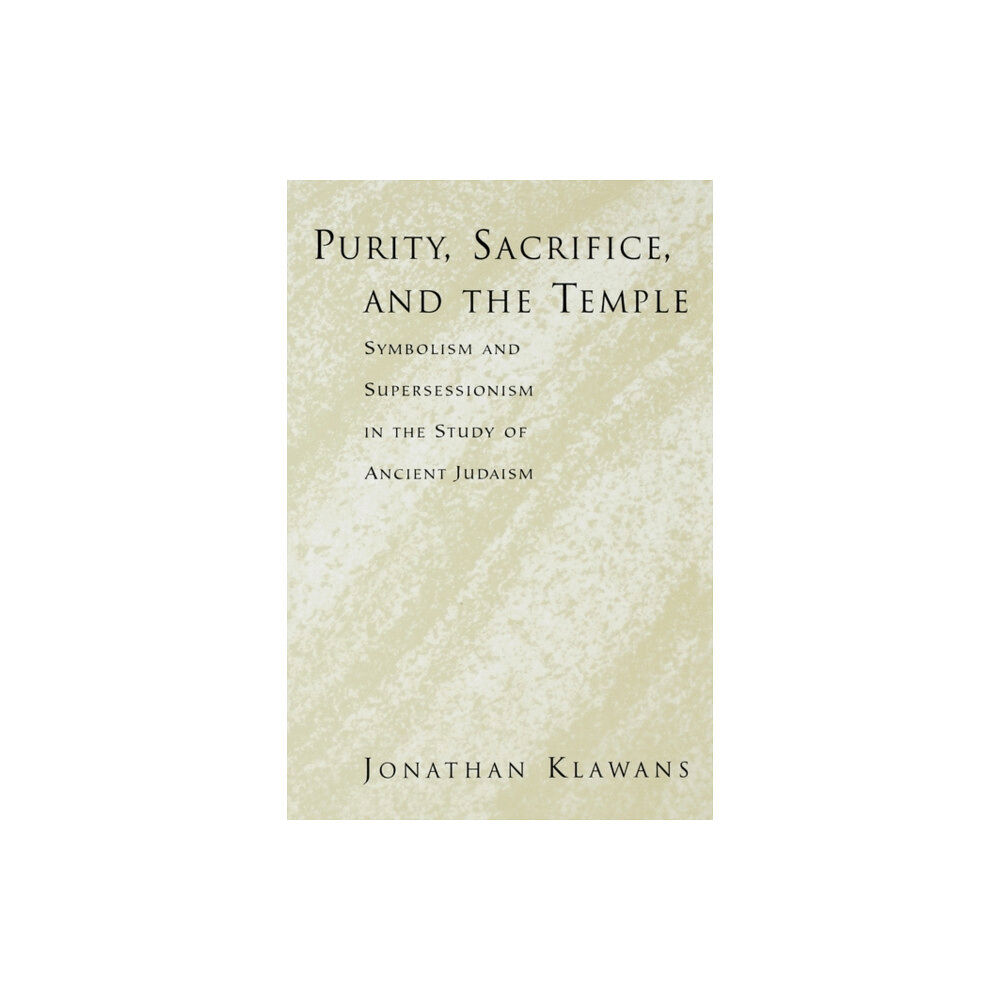- Hem
- Böcker
- Kurslitteratur
- Filosofi, Religion & Etik
- Purity, Sacrifice, and the Temple Symbolism and Supersessionism in the Study of Ancient Judaism (häftad, eng)

Purity, Sacrifice, and the Temple Symbolism and Supersessionism in the Study of Ancient Judaism (häftad, eng)
Ancient Jewish sacrifice has long been misunderstood. Some find in sacrifice the key to the mysterious and violent origins of human culture....
655 kr
Slut i lager
- Fri frakt
Fri frakt över 299:-
Snabb leverans
Alltid låga priser
Produktbeskrivning
Ancient Jewish sacrifice has long been misunderstood. Some find in sacrifice the key to the mysterious and violent origins of human culture. Others see these cultic rituals as merely the fossilized vestiges of primitive superstition. Some believe that ancient Jewish sacrifice was doomed from the start, destined to be replaced by the Christian eucharist.
Others think that the temple was fated to be superseded by the synagogue. In Purity, Sacrifice, and the Temple Jonathan Klawans demonstrates that these supersessionist ideologies have prevented scholars from recognizing the Jerusalem temple as a powerful source of meaning and symbolism to the ancient Jews who worshiped there.
Klawans exposes and counters such ideologies by reviewing the theoretical literature on sacrifice and taking a fresh look at a broad range of evidence concerning ancient Jewish attitudes toward the temple and its sacrificial cult. The first step toward reaching a more balanced view is to integrate the study of sacrifice with the study of purity-a ritual structure that has commonly been understood as symbolic by scholars and laypeople alike.
The second step is to rehabilitate sacrificial metaphors, with the understanding that these metaphors are windows into the ways sacrifice was understood by ancient Jews. By taking these steps-and by removing contemporary religious and cultural biases-Klawans allows us to better understand what sacrifice meant to the early communities who practiced it.
Armed with this new understanding, Klawans reevaluates the ideas about the temple articulated in a wide array of ancient sources, including Josephus, Philo, Pseudepigrapha, the Dead Sea Scrolls, New Testament, and Rabbinic literature. Klawans mines these sources with an eye toward illuminating the symbolic meanings of sacrifice for ancient Jews.
Along the way, he reconsiders the ostensible rejection of the cult by the biblical prophets, the Qumran sect, and Jesus. While these figures may have seen the temple in their time as tainted or even defiled, Klawans argues, they too-like practically all ancient Jews-believed in the cult, accepted its symbolic significance, and hoped for its ultimate efficacy.
Others think that the temple was fated to be superseded by the synagogue. In Purity, Sacrifice, and the Temple Jonathan Klawans demonstrates that these supersessionist ideologies have prevented scholars from recognizing the Jerusalem temple as a powerful source of meaning and symbolism to the ancient Jews who worshiped there.
Klawans exposes and counters such ideologies by reviewing the theoretical literature on sacrifice and taking a fresh look at a broad range of evidence concerning ancient Jewish attitudes toward the temple and its sacrificial cult. The first step toward reaching a more balanced view is to integrate the study of sacrifice with the study of purity-a ritual structure that has commonly been understood as symbolic by scholars and laypeople alike.
The second step is to rehabilitate sacrificial metaphors, with the understanding that these metaphors are windows into the ways sacrifice was understood by ancient Jews. By taking these steps-and by removing contemporary religious and cultural biases-Klawans allows us to better understand what sacrifice meant to the early communities who practiced it.
Armed with this new understanding, Klawans reevaluates the ideas about the temple articulated in a wide array of ancient sources, including Josephus, Philo, Pseudepigrapha, the Dead Sea Scrolls, New Testament, and Rabbinic literature. Klawans mines these sources with an eye toward illuminating the symbolic meanings of sacrifice for ancient Jews.
Along the way, he reconsiders the ostensible rejection of the cult by the biblical prophets, the Qumran sect, and Jesus. While these figures may have seen the temple in their time as tainted or even defiled, Klawans argues, they too-like practically all ancient Jews-believed in the cult, accepted its symbolic significance, and hoped for its ultimate efficacy.
| Format | Häftad |
| Omfång | 388 sidor |
| Språk | Engelska |
| Förlag | Oxford University Press Inc |
| Utgivningsdatum | 2009-05-13 |
| ISBN | 9780195395846 |
Specifikation
Böcker
- Häftad, 388, Engelska, Oxford University Press Inc, 2009-05-13, 9780195395846
Leverans
Vi erbjuder flera smidiga leveransalternativ beroende på ditt postnummer, såsom Budbee Box, Early Bird, Instabox och DB Schenker. Vid köp över 299 kr är leveransen kostnadsfri, annars tillkommer en fraktavgift från 29 kr. Välj det alternativ som passar dig bäst för en bekväm leverans.
Betalning
Du kan betala tryggt och enkelt via Avarda med flera alternativ: Swish för snabb betalning, kortbetalning med VISA eller MasterCard, faktura med 30 dagars betalningstid, eller konto för flexibel delbetalning.
Specifikation
Det finns tyvärr inga specifikationer att visa för denna produkt.
